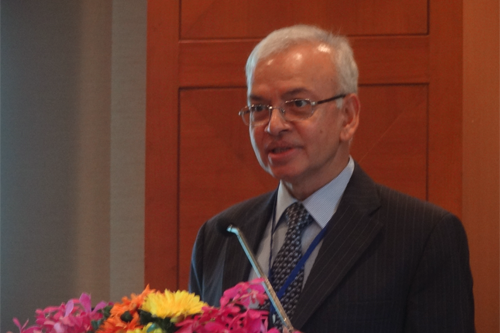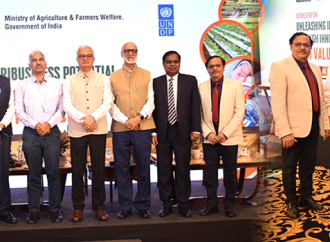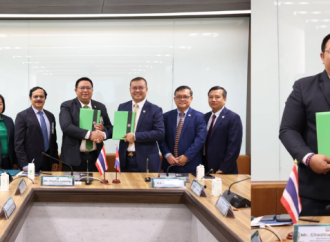IFAD-Supported APRACA Regional Project on Enhancing the Access of Poor Rural People to Sustainable Financial Services Through Policy Dialogue, Capacity Building and Knowledge Sharing in Rural Finance Inception Workshop 28-29 March 2013, Bangkok, Thailand Opening Remarks Ganesh Thapa Mr Kim Vada, Director General, Bank Supervision, National Bank of Cambodia and Acting Chairman of APRACA Mrs
IFAD-Supported APRACA Regional Project
on
Enhancing the Access of Poor Rural People to Sustainable Financial Services
Through Policy Dialogue, Capacity Building and Knowledge Sharing in Rural Finance
Inception Workshop
28-29 March 2013, Bangkok, Thailand
Opening Remarks
Ganesh Thapa
Mr Kim Vada, Director General, Bank Supervision, National Bank of Cambodia and Acting Chairman of APRACA
Mrs Poonsook Musiklad, Senior Executive Vice President, Bank for Agriculture and Agricultural Cooperatives (BAAC)
Dr Prakash Bakshi, Chairman, National Bank for Agriculture and Rural Development (NABARD)
Mr Won-Sik Noh, APRACA Secretary General,
Senior Officials of APRACA Member Institutions,
Distinguished Resource Persons,
Representatives of international organizations,
Distinguished Participants,
It is my great pleasure to be invited to this important workshop and to make opening remarks on behalf of the International Fund for Agricultural Development (IFAD). IFAD’s collaboration with APRACA dates back to the mid-1990s when with IFAD’s grant support, APRACA implemented the Microserv programme between 1996 and 2001. Under this programme, APRACA disseminated replicable rural finance models in selected countries of the region. We resumed our collaboration in 2007 with the implementation of a five-year project (called the FinPower Project) whose goal was to empower the rural poor through rural finance innovations. Implemented between 2007 and 2011, the objectives of this project were to foster an enabling, and pro-poor policy environment and regulatory framework for sustainable rural financial systems; encourage innovative approaches to rural finance; and share information and lessons from projects and programmes to promote replication of successful approaches in the region.
The final evaluation of the FinPower Project undertaken in 2011 concluded that it had strengthened the knowledge-sharing platform of APRACA. It had also enabled IFAD-supported investment projects in selected countries to access this platform’s activities, thus enabling them to integrate new approaches, products/services and methodologies in their programmes. The FinPower project was also able to raise awareness as well as generate commitment and action among APRACA member institutions about emerging issues in rural finance through the conduct of numerous regional and national forums, exposure visits, and the accumulation of wealth of published and unpublished knowledge materials on rural finance.
The review also identified a number of important lessons, which will be important for the implementation of this project. The first lesson is that more concerted efforts should be made to build synergy and to learn from other rural finance institutions and development partners. Second, although knowledge generated by the project was highly valuable, an inadequate sharing effort prevented APRACA members from fully benefiting from this valuable resource. Third, the focus of field level activities such as exposure visits and pilot testing should be on a fewer countries with relatively weaker systems of rural finance whereas activities related to knowledge sharing and dissemination should be open to all APRACA members. Fourth, a system should be established to provide feedback and comments on the relevance of project activities (e.g. studies, training) based on the experience of their beneficiaries. Fifth, a dual-track approach should be taken to prepare project publications, one intended for project level staff and the other for those at the policy level.
The review recommended the continuation of IFAD-APRACA partnership to consolidate the gains of past collaboration and to further deepen it with a view to addressing emerging issues in rural and microfinance in the region. Despite some success in increasing outreach and impact of rural finance delivery as well as achieving viability of rural financial institutions, many challenges still persist: high fixed and transaction costs, issues in combining financial and non-financial products, stringent lending requirements, seasonality and high exposure to risks inherent in agriculture.
The rural poor are facing additional challenges due to the rising prices of food and fuel, and the effects of global financial crisis. In addition, many countries are experiencing increased incidence and intensity of natural disasters resulting from climate change. It is generally agreed that the rural finance system, including rural microfinance, has not been able to deal with these emerging problems. On the positive side, the agriculture sector has undergone profound changes in the region including technological improvement, value chain integration, changes in consumers’ preferences, and increased demand for high-value and quality food. These changes have the potential of opening up new opportunities for the rural poor, particularly smallholder farm households and agriculture-related entrepreneurs to benefit from new agriculture dominated by high value chains.
Recent assessments of impact of microfinance- based largely on randomized control trials- have led to questions of claims of women’s empowerment and poverty reduction. The slowing global economy has also raised serious concerns about the immunity of microfinance sector and its potential for poverty reduction. A recent IFAD-sponsored study, however, confirms that microfinance not only reduces the incidence of poverty but also its depth and severity. Other factors that contribute to poverty reduction include gross domestic product (GDP) per capita and share of credit in GDP ( as a measure of financial development).
Increasing access of the rural poor to sustainable financial services will be important for the rural poor to meet the challenges of the changing global context and to benefit from new opportunities. This requires formulating enabling, pro-poor and client-centric rural finance policies; replicating new approaches, technologies and best practices; building institutional and technical capacities; and establishing effective knowledge documentation and sharing methodologies.
It is in this context that the new project has been designed. The goal and objectives of this grant project are consistent with one of IFAD’s priorities—to make a broad range of financial services available for both agricultural and related non-farm activities, with attention to those services which enhance resilience and improve risk management at the farm and household levels so that small-scale agricultural producers and other rural people can capture new opportunities in agriculture and related markets at reduced risk.
A number of bilateral and multi-lateral partners such as AFI, FAO, CGAP and GIZ are implementing programmes in support of rural and microfinance development in the region. I strongly feel that this project should work closely with other partners in sharing experiences and seeking opportunities for joint implementation of selected activities. I am very happy that partner organizations such as AFI and ESCAP have joined us today.
I am also happy to see some IFAD colleagues and staff from IFAD supported investment projects in Cambodia and Nepal, who will play an important role in the implementation of country level activities. Through loan-funded investment projects in project countries like Bangladesh, Cambodia and Nepal, IFAD has been working with the governments and other stakeholders in expanding the access of the rural poor to rural financial services. In Myanmar we are working with the government in finalizing the country strategy and an investment project in the agriculture sector. It would be important to link the activities funded through loan-projects and this grant-funded project for greater synergy. In the project, we also have envisaged collaboration with APRACA member institutions such as NABARD, BAAC and BRI so that the project can benefit from their expertise and experience through the South-South cooperation mechanism.
I am happy to note that resource persons from MS Swaminathan Foundation, CEAPRED, ESCAP, BAAC and ASA have agreed to make presentations in this workshop on the thematic areas included in the project. I am confident that this workshop will provide a unique opportunity discuss important issues in rural finance and to identify concrete set of activities for the project countries (Bangladesh, Cambodia, Myanmar and Nepal) and also at the regional level.
Last but not the least, I would like to express my sincere appreciation to APRACA Secretary General Mr Won-Sik Noh, Project Manager Mr Marlowe Aquino, and the APRACA Secretariat for organizing this important meeting. I wish the workshop a great success.
Thank you very much for your attention.















